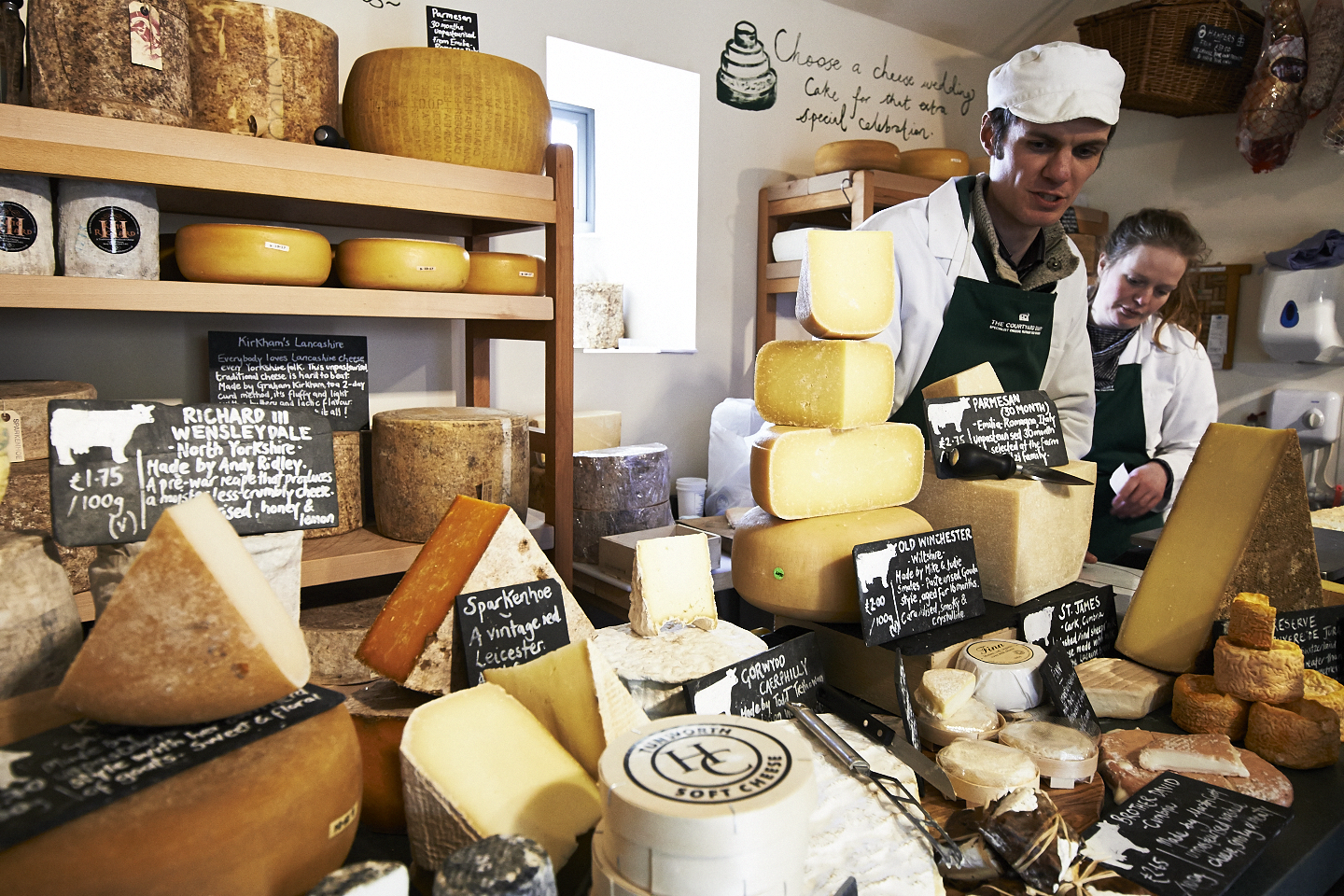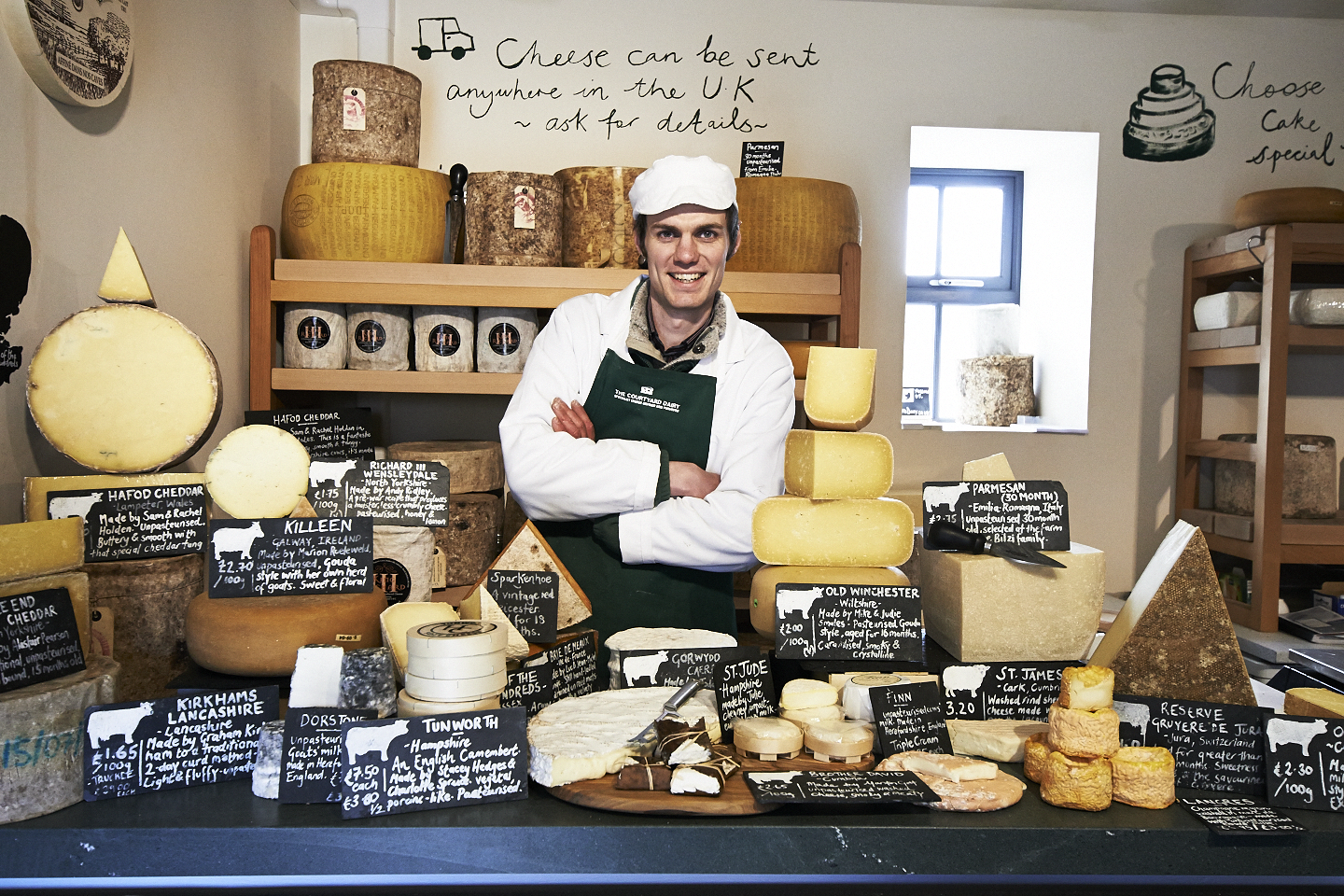For the second edition of Speciality Spotlight in 2023, we spoke to Andy Swiscoe, owner of award-winning Courtyard Dairy. Championing small, independent farmers, Andy and his team stock and supply a carefully chosen range of farmhouse cheeses selected direct from individual farms, with no compromises on quality or taste. We’re excited to share this fascinating & insightful conversation with Andy, which we hope you enjoy reading.
Tell us a bit about yourself and how you started Courtyard Dairy?
I grew up working with French cheeseboards in fine-dining. I loved the quality of cheeses we had so I moved abroad to study and apprenticeship in cheese maturing in France, which gave me my grounding in cheese.
Returning after my apprenticeship to the UK, I worked for cheesemongers Bath Fine Cheese and Paxton & Whitfield. But I always wanted to return North. So in 2012 my wife, Kathy and I, set up The Courtyard Dairy in Settle, North Yorkshire. We wanted to champion and support traditional farm-made cheese in this area; maturing them on site and encouraging local farms to diversify.
The uniqueness of what we were doing, coupled with our knowledge and amazing cheese range meant we went on to win Cheesemonger of the Year at the World Cheese Awards 2013. This was followed by accolades from Farm Shop & Deli Awards (2018 & 2020), and features in the national press (one of The Financial Times’ Top 50 Food Shop’s in the World; The Daily Telegraph’s Top 10 Cheese Shop in the World). The highlight was winning The Guild of Fine Food’s Golden Fork in 2021 for the positive impact we’d made for British Artisan Cheese.
We’ve always stood true to our idea of championing small-scale farm-made cheese and that’s what makes our shop continue to be special to this day.
What does your typical day involve?
Two of us start at 6am. Between 6 and 9 we cut our mail order (sending cheese gifts out across the UK) and restaurant wholesale; this will then go to be packed during the day.
At 9.30am the shop opens and three other cheesemongers arrive. We then do a daily brief, often tasting some cheese and learning about it. Throughout the day I vary between serving customers, looking after our cheese maturation (turning & brushing cheese), visiting cheese makers to taste and evaluate their cheeses and processes; and running cheesemaking courses. The shop closes at 5.30 and I go and have Thornborough Yorkshire cider with a chunk of cheese with my wife before thinking about what to have for tea.
How do you select the cheeses you store?
We rate the cheese on several factors:
1. Taste (it has to be amazing ‘of its type’ so if you buy it you’ll want to come back for more
2. Made on a family farm
3. Farming methods (sustainability & ethical factors, native breeds, etc.),
4. Cheese making procedures (traditional, slower, using old-fashioned techniques such as cloth-binding / slower bulk cheese-making cultures, raw milk etc.)
5. Locality of production
The more it scores the better!
What do you find most enjoyable about working in the world of cheese?
I love the fact we take milk and transform it into this solid which can technically last for thousands of years (they found some in a Pharaoh’s tomb 3200 years old!) and you get such a diversity of types, texture and flavours. I also love the community within small scale cheesemaking – making cheese like this is part of our social history and all of the suppliers we work with are small scale family farms striving to make a special product. It’s a pleasure to sell their produce.
What is the best-selling cheese?
Being in Yorkshire, it pains me to say it – but Kirkham’s Lancashire. We’re on the border right here between Lancashire and Yorkshire; the soft buttery-ness and light lactic flavour are winners with our customers. I like that Graham has been doing this all of his life, and he learnt how to make cheese from his Mum who learnt from her Mum. Not some foodie-fad but time-honoured traditional cheese passed down the family line.
At Peter’s Yard, time is our most important ingredient. Time for our sourdough to ferment; time for each cracker to cook and cool to irresistible crispness. What would you say is the most important component when making cheese?
We try to support traditional farm-made cheese; the way they used to be, for that maximum flavour. To make a cheese really outstanding and special it comes down to a couple of key factors: Breed and feed of animals (native breeds of cows on diverse herbal grasses) and slower traditional making procedures. A couple of cheeses that really highlight this and showcase how important these factors can be in making a really different cheese would be Hafod Cheddar and Stonebeck.
Tell us your favourite cheese & Peter’s Yard cracker pairing?
I love the Fig & Spelt Sourdough Crackers and their sweetness to match the soft sweet syrup-iness of the Leeds Blue – which has echoes of a soft Gorgonzola and the sweetness from the sheep’s milk. Mario is an Italian who moved here in 2001 making Italian style blue cheeses in Yorkshire and this one’s a real delight – perfect for the fig crackers.
Finally, what’s next for the Courtyard Dairy?
We’re currently building a big extension so we can make cheese on site, and have huge under-ground maturation rooms planned. Alongside this will be a museum on cheese and a cheese-based café. Basically we want to become an epicenter of traditional farm made cheese – where you can learn, taste, see the whole process and fall in love with cheese.
Find out more about Courtyard Dairy here.

